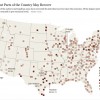Background
This page is no longer being updated. For ongoing coverage of this topic, go to New Hampshire Public Radio.
______
The Merrimack Valley follows the Merrimack River, straddling part of southern New Hampshire and a swath of northeast Massachusetts, including the cities of Lowell, Haverhill, and Lawrence. Residents on both sides of the border refer to their areas as “the Merrimack Valley,” but technically the Massachusetts side is considered the “Lower Merrimack Valley,” while the New Hampshire portion is the “Upper Merrimack Valley” (not to be confused with the “Upper Valley” in the Dartmouth-Sunapee region).
From the beginnings of the Industrial Revolution, the Lower Merrimack Valley was a manufacturing powerhouse. In the early 19th century, businessmen founded the city of Lowell as a textile mill town.
As the various mill industries picked up steam, they spread north into New Hampshire. While Manchester was the Upper Merrimack Valley’s most notable mill town, the industry also gained footholds in Concord and Nashua. As industrialization advanced over the decades, factories specializing in mechanical parts and other manufactured goods were established on both sides of the Valley.
But over time, some significant economic differences have developed between the Upper Merrimack Valley and the Lower Merrimack Valley. Both sides of the border have, of course, suffered job losses and other side effects of a bad economy. But in the long term, as American manufacturing has declined over the past half-century, the New Hampshire side has seen more success in diversifying its economy. As the capital city, Concord, of course, supports a large government workforce. According to the U.S. Census Bureau, more than one out of five residents are government employees. (Of course, these numbers are subject to change, especially given the state’s most recent budget.) Only 9 percent of people in Concord do factory work. These days, Nashua also skews heavily toward white-collar work, with 67 percent of residents holding down management, sales, and other office jobs. Only 12 percent of people work in factories. And in Manchester, New Hampshire’s largest city, 60 percent of residents work in professional fields, while 14 percent of people do production work.
Meanwhile, the Massachusetts Department of Workforce Development found that nearly one in five Lower Merrimack Valley jobs were in the manufacturing sector. As the national decline of manufacturing has accelerated during the recession, the Lower Merrimack Valley experienced greater — and faster — job loss than the rest of the state. Wages in the area are also significantly lower than the Massachusetts average, with the low-paying retail and hospitality sectors dominating the economy.
Despite these differences between the Upper and Lower Merrimack Valley, there is still a lot of interraction between the two areas. Lowell, Massachusetts, is considered part of the Greater Boston Area — as is Nashua, New Hampshire. Although mass transit between the Upper and Lower Merrimack Valley is decidedly lacking, easy Interstate access for much of the area has made it possible for many people to cross state lines as they commute to and from work.











